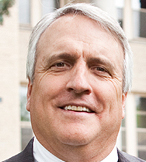 Former Colorado Gov. Bill Ritter used his time in office to build a new energy economy centered around public/private partnerships, research and development (R&D) initiatives, and economic development.
Former Colorado Gov. Bill Ritter used his time in office to build a new energy economy centered around public/private partnerships, research and development (R&D) initiatives, and economic development.
Now out of office, he is spreading the message of how states can replicate what Colorado did to prosper in the new energy economy.
During the opening keynote presentation at the REFF-Wall Street conference, co-hosted by the American Council on Renewable Energy and Euromoney Energy Events, in New York City, Ritter illustrated how – with proper planning – renewables can boost a state's economic fortunes.
‘The one sector that grew in the worst economy since the Great Depression was clean energy,’ he said.
Ritter, who did not seek re-election in 2010, was elected in 2006 and now serves as director of the Center for the New Energy Economy at Colorado State University, said the state's impressive returns were largely the result of its aggressive policy stance on renewable energy. In fact, during Ritter's four-year term, he signed 57 bills relating to clean energy and bolstered the state's renewable portfolio standard (RPS).
Colorado became the first state with a voter-approved RPS in 2004 with the passage of Amendment 37, which set a 10% by 2015 goal. In 2007, the RPS was doubled to 20% by 2020. The mandate has since been raised to 30% of electricity coming from renewable resources by 2030.
The policy framework, Ritter said, acted as a magnet for manufacturers, such as Siemens and Vestas, both of which built R&D facilities in the state.
In the case of Vestas, which built what Ritter calls the world's largest tower factory in Pueblo, Colo., the state was able to bring much-needed economic prosperity to a part of the state that desperately needed it.
Vestas reportedly has spent more than $1 billion building four factories in Colorado to replace turbine imports in the U.S.
‘Before Vestas came in, there hadn't been much good news happening in Pueblo for a long time,’ Ritter said.
Colorado is also home to world-class R&D facilities such as the National Renewable Energy Laboratory and several educational institutions.
‘Having the R&D side helps move forward the policy,’ he explained.
It was fitting that the keynote's focus was energy because Ritter's rapid-fire delivery played to the topic at hand. He stressed to the packed crowd that what happened in Colorado was not and should not be an isolated case.
‘[The U.S.] needs to continue the R&D message; we need to own it,’ he said. ‘If we don't keep moving forward, we will lose the global race.’
He also instructed attendees not to wait for help from the federal government.
‘We can work state by state. By moving together, we can make it happen,’ Ritter explained.
Photo courtesy of Colorado State University Photo Services Department



